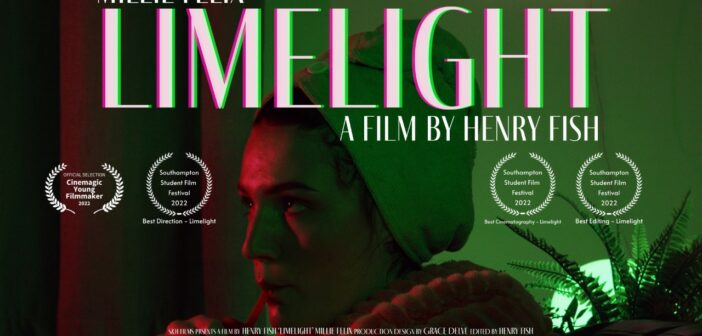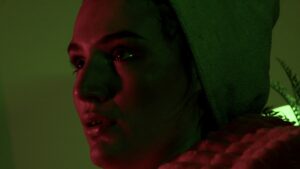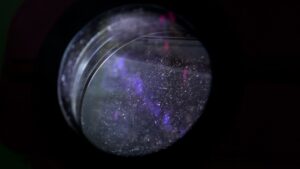-
6
The universal horrors of failure and embarrassment are the crux of this quasi-Lynchian short directed by Harry Fish and Khairah Boukhatem. There is a somewhat unspoken stigma that surrounds the term “student film.” Often it may imply that what you are about to watch is in some way cheap and amateurish. Limelight manages to shed this stigma almost completely. While it is undoubtedly filmed on a tight budget and looks like a student film, it succeeds in my opinion where most modern horror films fail; it can evoke some form of emotion from the viewer due to how relatable the central (and only) character of the film is.
The film follows Dorothy Doad, a young woman who dreams of making it big as an actress but is unfortunately hindered by her sub-par acting skills and her abundance of insecurities. For a film that only has one cast member, it cleverly and subtly employs Millie Felix (here playing Doad), as both the protagonist and antagonist of the narrative. The film focuses solely on the fallout of Doad being rejected for an unspecified acting role as she spirals into a depression brought on by the rejection. Doad is unable to let this go and eventually becomes consumed by this seemingly trivial failure.
The film is shrouded in ambiguity – as most horror shorts are – primarily because it deals with the subconscious of our protagonist. In this sense, Dorothy’s further failure to accept her shortcomings and constructively learn from them makes herself her own worst enemy; Dorothy’s desire to be something more than she is likely capable of being is such an overpowering dream that it becomes all-consuming.
Doad’s inability to overcome being rejected spurs a loss of her true identity, to such an extent that her fate in the film’s final moments infers that she has become inseparable from this failure. It becomes immediately clear to the viewer that from the film’s opening scene, Doad will not be capable of realising her dreams of becoming a Hollywood starlet; her audition tape is so cringe-inducing that while you will pity her, it is very painful to watch, and I for one certainly was not surprised when she did not get the part. You also get the impression that these mysterious studio ‘higher-ups’ are going quite easy on her in the manner of their rejection. After all, “this role is going in another direction,” is a kind way of saying: it is not you, it is me. So, the scene where Doad is breaking down in tears is more than likely an indication that she knows exactly how they intended this rejection to be taken – regardless of how well they sugar-coated it.
In moments of sadness, we often look for the light in the dark. However, Limelight shows us that when the guiding light emanates from a film projector, we may be doing ourselves more harm than good. As Doad watches the old rendition of ‘The Gypsy in My Soul,’ there is such a vacant expression on her face that one would not necessarily expect to see when we watch something as a means of comfort. This appears to be a crucial moment in Doad’s oncoming mental breakdown; she now evidently resents that glamorised, colourful worldview that Hollywood has churned out for decades. While she sits brooding in the almost toxic green and purple lighting, Doad comes across as the petulant child who did not get the desired part in her school drama production and goes on to hate the material, as well as the character she so desperately would have wanted to play, and everything that her dream initially stood for.
The horror of Dorothy Doad is reasonably tragic. Her audition is very wooden as performances go, with her rictus grin being transparent from the get-go. Everything from her mannerisms to her appearance reveals that she was merely trying to replicate what she saw on screen. Yet in doing so, she loses who she really is; Doad is not the grinning clown in makeup, she is the loser sitting on her settee with nothing left to aspire to but to lament over her crushed dreams. She cannot accept the fact that she will never become like the actresses she idolises, and so in her final attempts to be something that she could never be, she loses what little individuality she previously possessed. The woman staring into our souls at the short’s climax is no longer Doad, but rather just ‘a part.’ The elusive part/role that she cannot let go of. The Hollywood absolute is that the ‘it’ factor is everything; sadly, not everyone comes to terms with the fact that we as individuals may not possess it. Most people overcome this fact, and there is no harm done. Doad, however, does not appear to be one of these people, and in her refusal to accept the fate of irrelevancy that has been allocated for her, she reveals to the viewer exactly how horrifying things can be if we are unable to come to terms with our inability to make the cut.
It is clear where Fish’s inspirations as the writer come from; I half expected Doad to turn to the camera to announce to Mr DeMille that she is ready for her close-up. Though herein lies the most ambiguous part of the short, it is unclear where the filmmakers stand on the golden age of Hollywood itself; the film would imply they are immune to the charm of the bright lights (whereas Doad is not), yet ironically a film that seems to critique Hollywood is heavily inspired by the films Hollywood produced.
The film is well-lit, it is shot as decently as a student film can be shot, and the sound is on point when it needs to be, yet it pales in comparison to Fish’s writing which (if we are being honest) is doing all of the heavy liftings with this short. The strongest element of the film is the way the concept of failure as a form of horror is relatable to everyone who will watch this film; we are, in a way, all Dorothy Doad. We share in her experience of rejection, yet how we deal with said rejection is where we (hopefully) differ from her. While the idea of Limelight may be better than the film itself, everyone involved in the production has made something of considerable merit. And, of course, the beauty of the ambiguity of it all means that everything I have just said could be completely false. So, watch it for yourselves, and make your own minds up, as Limelight is one student production that will prove worthy of your time.
To view Limelight, click HERE.






